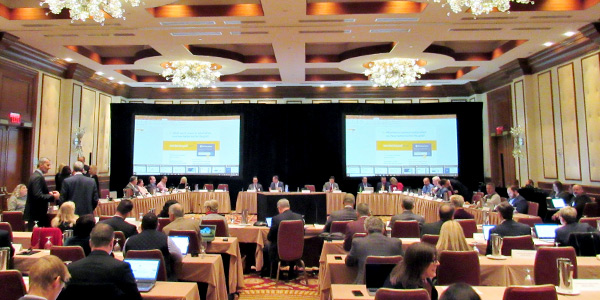By Amanda Durish Cook
MISO’s Advisory Committee on Wednesday said it will vote next month on whether to recommend that the RTO’s Board of Directors split up the Environmental and Other Stakeholder Groups sector to afford environmental advocates a singular voice.
The debate about the change originated last June when the Lignite Energy Council (LEC) approached MISO for membership. Not fitting neatly into any one of the RTO’s 10 stakeholder sectors, the LEC was ushered to the Environmental/Other sector.
Some stakeholders have said that MISO should create a catch-all 11th sector titled “Affiliate Members” to broaden the scope of new potential members. Others have countered that members of an additional, miscellaneous sector would run into issues with forming a cohesive voice and settling on MISO member voting issues. Still others maintain that MISO should scrap its requirement that prospective members must designate a sector in order to join the RTO. (See Advisory Committee Considers 11th MISO Sector.)
During a conference call Wednesday, the AC settled on two options. The first would allow LEC to join the Environmental/Other sector on a six-month trial basis, maintaining the status quo. The other would recommend that the board consider creating the Affiliate Members sector.
Under the second option, the standalone Environmental sector would retain its two existing votes, while the Affiliate Member sector would assume no voting rights in either the AC or Planning Advisory Committee. AC and PAC votes are only considered advisory to the board and are not binding for creating RTO policy. The Affiliate Members sector would still be able to vote in stakeholder subcommittees and board member elections and submit comments during the AC’s quarterly hot topic discussions.
‘Inherent Difficulty’
During MISO Board Week in December, Clean Grid Alliance’s Beth Soholt said the Environmental/Other sector was willing to attempt a six-month test period with LEC.
“We’ll find out more once we have an ongoing relationship,” Soholt said at the time. “We don’t think this solves the ongoing problem of what to do if we get more ‘others.’ … We still need to work on the issue longer term. We still don’t know how big the red box is of members that were trying to join but didn’t.”
MISO does not reveal the names of prospective companies and organizations seeking to join and only publicizes membership of those approved by the board.
The origins of MISO’s practice of relegating “Other” members to the Environmental sector are no longer clear. The division of sectors first occurred sometime over 1998-2000, according to longtime stakeholders.
“I think we have a short-term problem here, and we have a long-term problem here,” Soholt said during the call, noting that even if the Environmental/Other sector accepts the LEC into its membership on a temporary basis, the dilemma remains of what to do with other new, hard-to-pin-down members.
“It doesn’t make a lot of sense to put all other members in a sector that has such a clearly defined view. They have a strong, clearly defined sector that has coalesced around an environmental standpoint,” North Dakota Public Service Commissioner Julie Fedorchak said on behalf of the Organization of MISO States. Fedorchak also pointed out that MISO’s environmental groups and the LEC have “diametrically opposed views.”
“These aren’t just idle differences in opinion,” she said.
AC Vice Chair Tia Elliott said it could be that the LEC becomes a “persona non grata” in the Environmental/Other sector.
Some members voiced concern about the committee recommending a new standalone sector for seemingly just one entity and suggested an incubation period where it only proposes the Affiliate Member sector once a certain number of similarly situated affiliate members join MISO.
Multiple members asked how MISO would define “affiliates” for the sector. The Sustainable FERC Project’s John Moore said there’s an “inherent difficulty” in defining the catch-all sector.
“We don’t know who’s going to join,” AC Chair Audrey Penner said. “We only know that the Lignite Energy Council has been the most vocal about it. … I only know that it’ll be a home for those that wouldn’t otherwise have a home in MISO.”





